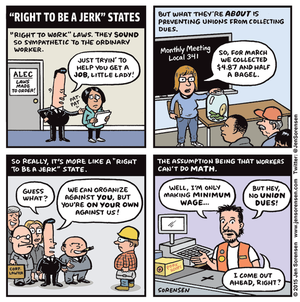Difference between revisions of "Misnomers/right to work"
(freedom to become enslaved) |
(Wikipedia; note about non-compete clauses) |
||
| Line 5: | Line 5: | ||
This is the same kind of logic which argues that people aren't free unless they are [[freedom to become enslaved|"free" to sell themselves into slavery]]. | This is the same kind of logic which argues that people aren't free unless they are [[freedom to become enslaved|"free" to sell themselves into slavery]]. | ||
{{need/more}} | {{need/more}} | ||
| + | ==Notes== | ||
| + | Someone said that right-to-work laws have the advantage (from the worker's POV) that they also ban {{l/wp|non-compete clause}}s, but this does not seem to be true; the only RtW states that also restrict non-compete clauses are Florida (very little restriction) and Texas. | ||
| + | ==Links== | ||
| + | ===Reference=== | ||
| + | * {{wikipedia|Right-to-work law}} | ||
Revision as of 20:59, 28 March 2015
The phrase "right to work" (RtW), which generally refers to anti-union laws (aka "right-to-work laws") does not actually guarantee a right to work. What those laws actually do is take away negotiating power from workers and give it to management. It's basically removing a protection from the workers and then saying that this gives the workers a new "right" because now they're free to work without that protection.
This is the same kind of logic which argues that people aren't free unless they are "free" to sell themselves into slavery.
| This page needs more of something. |
Notes
Someone said that right-to-work laws have the advantage (from the worker's POV) that they also ban non-compete clauses, but this does not seem to be true; the only RtW states that also restrict non-compete clauses are Florida (very little restriction) and Texas.
